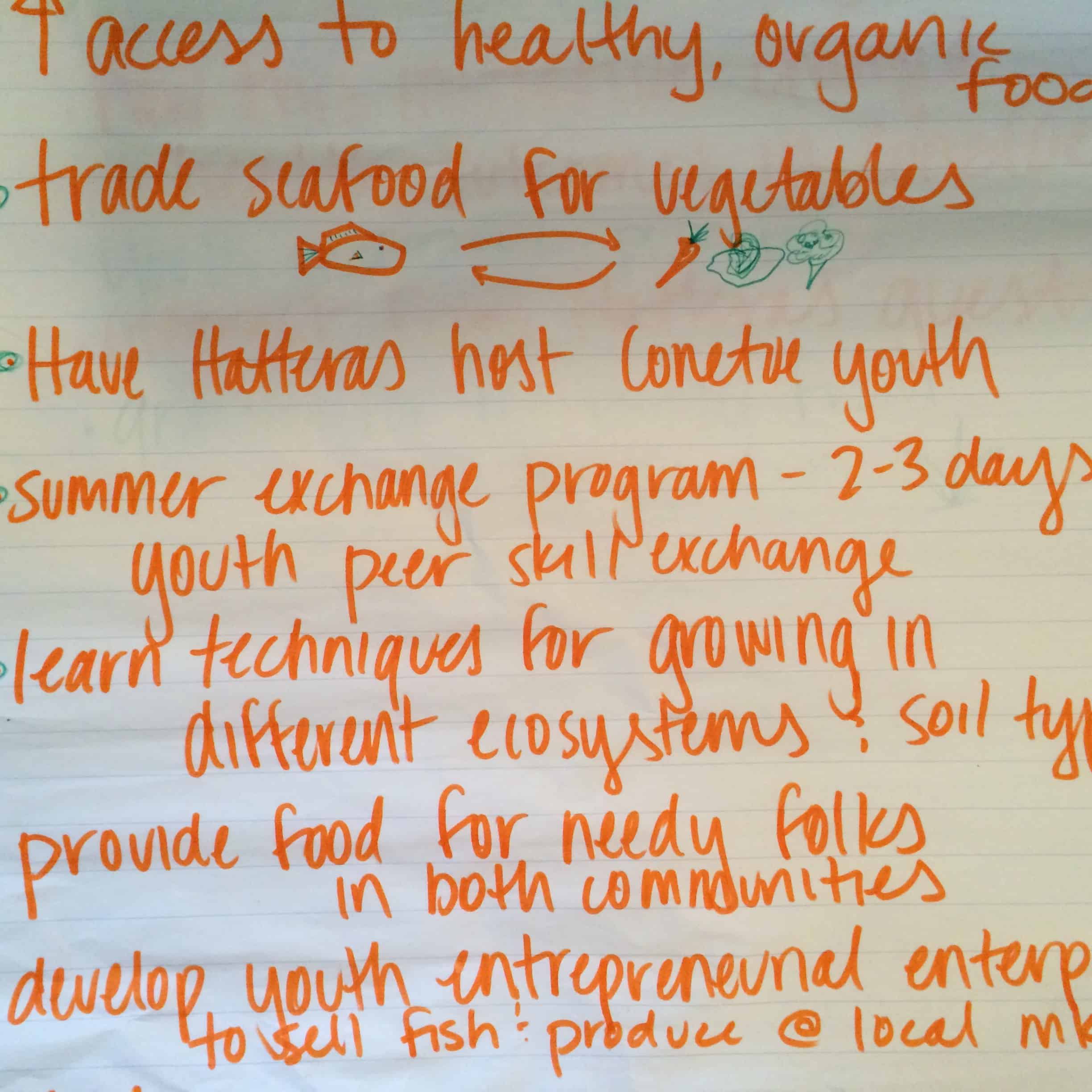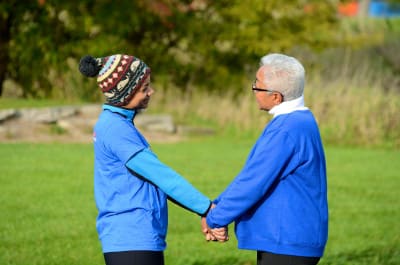Resourceful communities
On Friday, November 7, 2014, I was sitting in a meeting on food access when Mikki Sager with The Conservation Fund started talking about resourceful communities.
She mentioned some students in Hatteras and some students in Conetoe who were interested in trading fish for vegetables. A food exchange.
I couldn’t remember the last time I had seen a story about students in either community. Some parts of our state just go uncovered by the news.
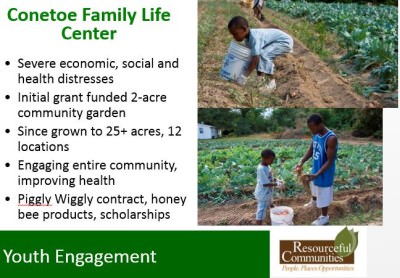
On Sunday, November 9, I emailed Mikki. She responded that day. By Wednesday, November 12, Mikki had connected me with Evan Ferguson, the teacher spearheading the trip from the Hatteras end. We talked on the phone the next day.
$900 was standing between these kids and their great idea, and $900 is a lot of money in Hatteras and Conetoe.
It was a powerful reminder to me that those in need, those who would benefit the most, often don’t have information about the grant opportunities that exist across our state. Philanthropy is one of our strong suits.
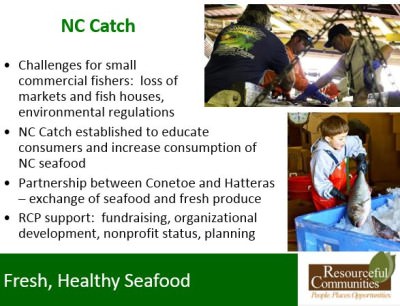
The Conetoe kids had been to Hatteras for the “Day at the Docks” festival that celebrates the work and culture of commercial fishing, bringing produce and honey to be used in the seafood throw-down cooking competition. That’s how Evan knew about them. It was time for the Hatteras kids to go to Conetoe.
Before long, a team had come together to plan a youth cultural exchange on Monday, December 8. Not even a Nor’easter could stop these kids from getting together.
It was the first of four visits to Hatteras and two visits to Conetoe for Alex Granados, EdNC’s researcher/reporter, as he produced our short documentary, Live United, about the students and the exchange.
Tomatoes, taking on the world, and empowering others
I never had the opportunity to meet Jamie Kirk Hahn. Dedicated to food access among many other issues, Jamie was a wife, a daughter, and a political activist. She was a quiet leader, working hard behind the scenes, not in the spotlight. The Jamie Kirk Hahn Foundation exists to continue Jamie’s work even though she is no longer with us.
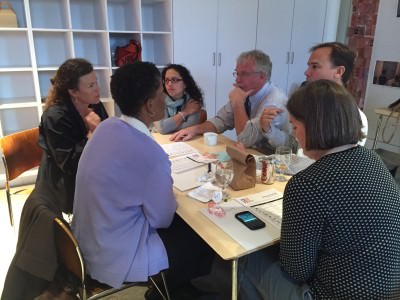
In Jamie’s journal, her dreams included growing tomatoes, taking on the world, and empowering others. She would have loved the kids and the spirit behind the Hatteras/Conetoe exchange.
Nation Hahn, Jamie’s husband, was with me in that meeting on November 7. We are on the community leadership council of the Z. Smith Reynolds Foundation, and three times a year the council and staff convene to do a deep dive on an important issue facing North Carolina.
He looked over at me as Mikki was talking with that look in his eye that means, “You on it?” There was never any question that that these kids were going to get to go to Conetoe once he heard the story.
Gathering for Good
The Jamie Kirk Hahn Foundation is pioneering a concept, called Gathering for Good, which brings together emerging and existing leaders who are working to create a brighter future for our communities.
The goal of each event is to create a space for conversation about issues that matter.
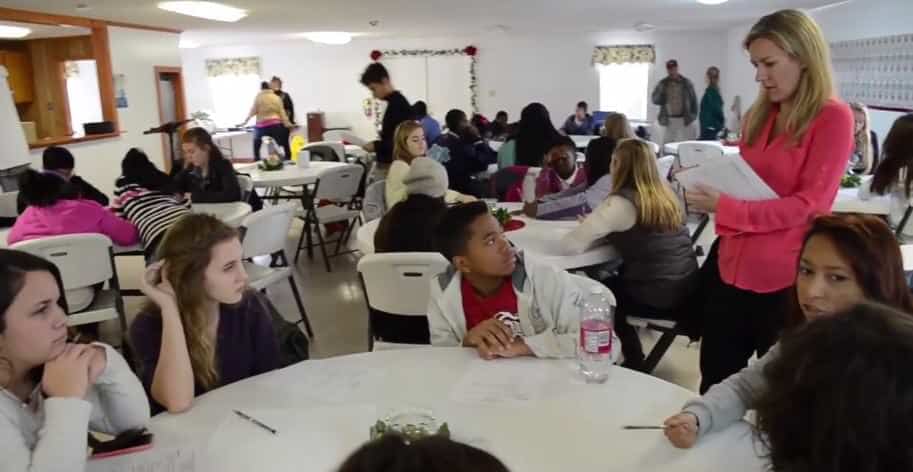
Gathering for Good attendees are diverse, engaged, new to each other, and committed to change. Participants are encouraged to explore the current state of the issue at hand, uncover new ideas together, build on existing solutions, and develop plans toward action on these issues.
And so, on December 9, the bus driver braved the flooded streets of Hatteras to get the students off the island so they could travel the 160 miles to Conetoe to engage in a Gathering for Good worthy of Jamie.
I hope she would have been proud.
Think about it. A group of kids from very different parts of our state. A whole lot of diversity. And they sit down together and they share a meal and not only do they actually talk — which I was worried about — but they wonder and they dream.
How to increase awareness of health benefits?
How to access, really access, healthy, organic food?
How to logistically trade fish for vegetables?
Could there be a summer skill exchange, where students in Conetoe learn to fish and students in Hatteras learn to farm?
How to learn about techniques for growing vegetables in different ecosystems?
If the exchange worked, would there be enough food for needy families in the communities too?
Momentum for change
Here is our most recent update from Evan:
“At our last visit, we talked about Conetoe traveling here this summer so we can take them fishing and introduce them more to our way of life. Next year, we plan to visit Conetoe in the fall and spring to continue the food exchange and relationship with them. I’m confident this project will continue to thrive.
I’m excited about our school plans to expand our gardens and food program. We received two grants and a donation that will help make this happen. BCBSNC Foundation awarded us with a $5,000 equipment grant to expand on a healthy eating initiative here on the island. We will be using the funds to work with elementary age students and purchase additional raised beds and supplies, grow system/lights, local fruit trees, bee keeping equipment, and soil.
Resourceful Communities and Saltwater Connections awarded us with $9,000 to begin work on a “curriculum” project with Ocracoke and Down East Carteret County. The goal here is to supplement any equipment we might need for our school and to work with the other schools to incorporate like goals and classroom lessons. They want to begin doing something similar in Ocracoke and East Carteret and these funds will help with professional development.
We were also chosen to receive two bee boxes from Burt’s Bees. We plan to work towards starting our bee colony here in spring 2016. Our biology teacher, Erin Del Monte, is working to incorporate these skill sets into her classes in order to make sure this is a true STEM collaboration within our school.
I am planning to take the Agriculture Praxis next year with hopes to teach a horticulture class in 2016-17 school year. I think that will be a great addition to our Foods classes here.
Lots of good things tend to happen after a Gathering for Good, but my favorite thing is that these events create momentum for change.
Learn more about The Conservation Fund and resourceful communities
The Conservation Fund’s Resourceful Communities creates opportunities that preserve our rural landscape, lift people out of poverty and celebrate unique cultures. Working with a network of 500 grassroots and community organizations, a balanced “triple bottom-line” approach is taken that generates economic, environmental and social justice benefits. The combination of direct support, skills building and connections to resources nurtures real change where it’s needed the most. By bringing together communities and conservation, people and places, more than 1,000 jobs have been created or retained with a $12 to $1 return on investments in community solutions.
Learn more about the BlueCross BlueShield of North Carolina Foundation
In 2015, 19 North Carolina organizations received BCBSNC Foundation grants to increase access to healthy local food for rural communities.
Equipment grants will be used to increase access to healthy food for low income and vulnerable populations through projects such as this food exchange between schools in Conetoe and Cape Hatteras. Other initiatives include upgrading kitchen equipment to enable healthy cooking and food preparation for 600 Hispanic/Latina clients in Madison, Mitchell, and Yancey Counties and increasing access to healthy, culturally-appropriate food for refugee and immigrant farm families in Orange and Durham Counties by purchasing a professional tiller to cultivate a 5-acre community farm.
“We share the same conviction of The Conservation Fund that healthier people make stronger communities.” said Kathy Higgins, president of the BCBSNC Foundation. “The opportunity to partner with these grantees will help expand healthy food options to 19 communities. We are working together to build a healthier state and people.”
Healthier students. Healthier schools. Healthier communities.
